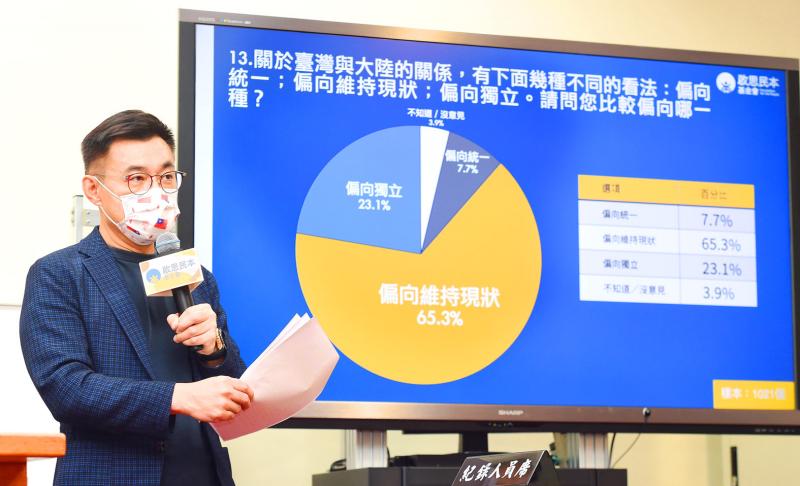More than 65 percent of respondents supported extending compulsory military service to one year amid heightened Chinese military activity, a Foundation for the People poll showed yesterday.
Chinese Nationalist Party (KMT) Chairman Johnny Chiang (江啟臣), who is chairman of the foundation, announced the results at a news conference in Taipei attended by foundation chief executive officer Huang Tzu-che (黃子哲), retired air force lieutenant general Chang Yen-ting (張延廷) and National Chengchi University professor Huang Kwei-bo (黃奎博).
Taiwan in 2018 started its transition to a voluntary military system, with men who fit the criteria required to undergo four months of military training, which was shortened from one year.

Photo: Liao Chen-huei, Taipei Times
More than half of respondents said that a year of mandatory military service should be reinstated, while 12.9 percent said that the four-month regime should be kept, 5 percent said it should be eight months and 4.6 percent said it should be 10 months, the survey showed.
Asked about national security strategies, 61 percent said that trade across the Taiwan Strait can relieve tensions, while 29.2 percent said it makes Taiwan more reliant on China, the survey showed.
Asked whether Taiwan should bolster its military deterrence capabilities or diplomatic efforts in the face of military threats from Beijing, 55.9 percent of respondent said both were necessary, 24.7 percent said only the latter was needed, 9.6 percent said that only the former was needed and 6.6 percent said that neither was needed, it showed.
Regarding the visit of US House of Representatives Speaker Nancy Pelosi to Taiwan last week, 45.1 percent said it caused more harm than good, 27.4 percent said the opposite and 22.9 percent thought it had pros and cons, the survey showed.
Seventy-seven percent of respondents said that the government should notify the public if Chinese missiles fly over Taiwan, while 11.8 percent were against such notifications, it showed.
The public is generally unsatisfied with the government when it comes to national security, which might be due to the way it has responded to the most recent Chinese military drills, Chiang said, adding that the government should announce the activities of the Chinese People’s Liberation Army to put people’s minds at ease.
Asked about their stance on cross-strait relations, 7.7 percent of respondents were prounification, 65.3 percent preferred the “status quo” and 23.1 percent were proindependence.
The poll was conducted from Friday to Sunday by sending out questionnaires on Facebook and collecting 1,021 valid responses from people over the age of 18. It has a confidence level of 95 percent and a margin of error of 3.07 percentage points.

Alain Robert, known as the "French Spider-Man," praised Alex Honnold as exceptionally well-prepared after the US climber completed a free solo ascent of Taipei 101 yesterday. Robert said Honnold's ascent of the 508m-tall skyscraper in just more than one-and-a-half hours without using safety ropes or equipment was a remarkable achievement. "This is my life," he said in an interview conducted in French, adding that he liked the feeling of being "on the edge of danger." The 63-year-old Frenchman climbed Taipei 101 using ropes in December 2004, taking about four hours to reach the top. On a one-to-10 scale of difficulty, Robert said Taipei 101

Nipah virus infection is to be officially listed as a category 5 notifiable infectious disease in Taiwan in March, while clinical treatment guidelines are being formulated, the Centers for Disease Control (CDC) said yesterday. With Nipah infections being reported in other countries and considering its relatively high fatality rate, the centers on Jan. 16 announced that it would be listed as a notifiable infectious disease to bolster the nation’s systematic early warning system and increase public awareness, the CDC said. Bangladesh reported four fatal cases last year in separate districts, with three linked to raw date palm sap consumption, CDC Epidemic Intelligence

Two Taiwanese prosecutors were questioned by Chinese security personnel at their hotel during a trip to China’s Henan Province this month, the Mainland Affairs Council (MAC) said yesterday. The officers had personal information on the prosecutors, including “when they were assigned to their posts, their work locations and job titles,” MAC Deputy Minister and spokesman Liang Wen-chieh (梁文傑) said. On top of asking about their agencies and positions, the officers also questioned the prosecutors about the Cross-Strait Joint Crime-Fighting and Judicial Mutual Assistance Agreement, a pact that serves as the framework for Taiwan-China cooperation on combating crime and providing judicial assistance, Liang

US climber Alex Honnold left Taiwan this morning a day after completing a free-solo ascent of Taipei 101, a feat that drew cheers from onlookers and gained widespread international attention. Honnold yesterday scaled the 101-story skyscraper without a rope or safety harness. The climb — the highest urban free-solo ascent ever attempted — took just more than 90 minutes and was streamed live on Netflix. It was covered by major international news outlets including CNN, the New York Times, the Guardian and the Wall Street Journal. As Honnold prepared to leave Taiwan today, he attracted a crowd when he and his wife, Sanni,